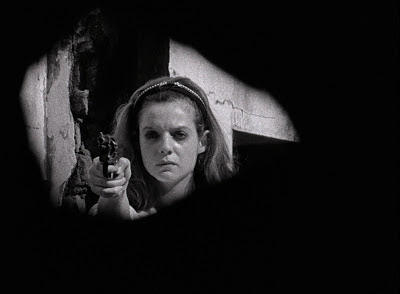My Father and the Man in Black
Any film that touches on Johnny Cash’s pills-and-booze days can’t be that bad, right? And sure enough, Jonathan Holiff’s documentary peaks behind the curtains at a singer on the verge of self-destruction. However, the real subject is the filmmaker’s father, Saul, who shepherded Cash through the peak of his career from 1960 to 1973. Following decades of battling a few demons of his own, Saul committed suicide in 2005, leaving his son with a shed full of Cash memorabilia and a lifetime of unanswered questions. The portrait of a distant, cruel father is buttressed with striking archival finds, such as Saul’s audio diaries and recordings of his phone conversations with Cash, but Jonathan’s need to push the film towards some sort of cathartic revelation can only end in disappointment. The big reveal is that his father was as self-doubting and tortured as the rest of us, a mundane epiphany by any standard. “A Boy Named Sue” offers just as barbed a portrait of father-son relationships in less than four minutes.
Tabu
Much like the F.W. Murnau masterpiece of the same title, Miguel Gomes’ Tabu is a tale of paradises lost and found. Divided between present-day Portugal and Africa during the burgeoning uprisings of the 1950s, the film focuses on a woman named Aurora. In the present, she’s a doddering old lady, lonely and paranoid as she loses her life savings to a gambling addiction. In the past, she’s the radiant young wife of a successful colonial landowner in Africa, willing to throw it all away for a passionate love affair with a musician. Dreamy and sensual, this dialogue-free section is narrated by Aurora’s long-lost former lover, who sorrowfully recounts the passions that would destroy the pair. But beneath the doomed affair lies the threatening shadow of colonialist oppression, personal shame merging with public crime in a phantasmic vision of self-recrimination and horror. Sublime.
The Last Time I Saw Macao
During the question-and-answer session following The Last Time I Saw Macao, an audience member spoke what was on most of our minds and invoked the name of Chris Marker. High praise, to be sure, but it doesn’t quite capture the peculiarity of this B-movie documentary, to borrow a phrase from co-director Joao Pedro Rodrigues. In this distinctive hybrid film, Rodrigues’ directing partner Joao Rui Guerra da Mata is returning to the city of his past after decades of separation, eager to rediscover the city that has dwelled in his mind for so long. Yet what the pair finds is a world of glory and decay, lonely side streets and desolate buildings. Over top the images the filmmakers impose a lurid sci-fi radio play featuring a missing transvestite, a criminal kingpin named Madame Lobo, a handful of stray allusions to Josef Von Sternberg’s Macao, and a glowing birdcage that turns people into beasts. Fascinating as much for its low-budget formal ingenuity as its twisty narrative, the film plays with memory and fantasy in its efforts to recapture a city lost to time. What else can it finally do but blow it up? The city is gone. The city never was.
The Metamorphosis
The VIFF program guide name checks Guy Maddin for The Metamorphosis, and it’s hard to argue the point. Like the Canadian master, this South Korean short (directed by Yun Kinam) trades in silent film aesthetics, amped up to borderline camp—and it even has an absent father figure, as per Maddin, although daddy in this case is thrown out of the house for turning into a vampire and attacking his daughter/mime/whatever. Is it a tortured vision of domestic abuse and dysfunction, or a semi-coherent parade of hyper-stylized tropes stolen from the graveyard of film history? Well, it’s fun while it lasts, whatever the hell it is. Sadly, for all the dramatic posturing—Hans Zimmer’s score for The Dark Knight Rises sounds like the Beach Boys next to this film—the ending fizzles, with the film clumsily rushing headlong towards its conclusion.
Emperor Visits the Hell
Several chapters from the 16th century Chinese epic Journey to the West are reworked for modern times in Li Luo’s Emperor Visits the Hell, with mixed results. In a mere 67 minutes, Li unpacks a varied tale involving a pool-hall hustler who loses his head to a dream, forgery in the book of life, stray ghosts, and the emperor’s titular trip to deal with the ramifications of it all. Yet as fantastic as this all sounds, Li sticks to a deadpan realism. Hell is a room as bland as any other, while the gateway to the underworld is, amusingly enough, a non-descript bus stop. The mundane grounds the mythical, allowing the director to emphasize the satirical undertones of the story—it turns out even the emperor must learn to kowtow sometimes—rather than getting hung up on supernatural visions. Unfortunately, the narrative is stitched together with little picture-book interludes and climaxes with the lead actor drunkenly ranting at the wrap party, lending a haphazard air to what is otherwise a powerful concept.






No comments:
Post a Comment